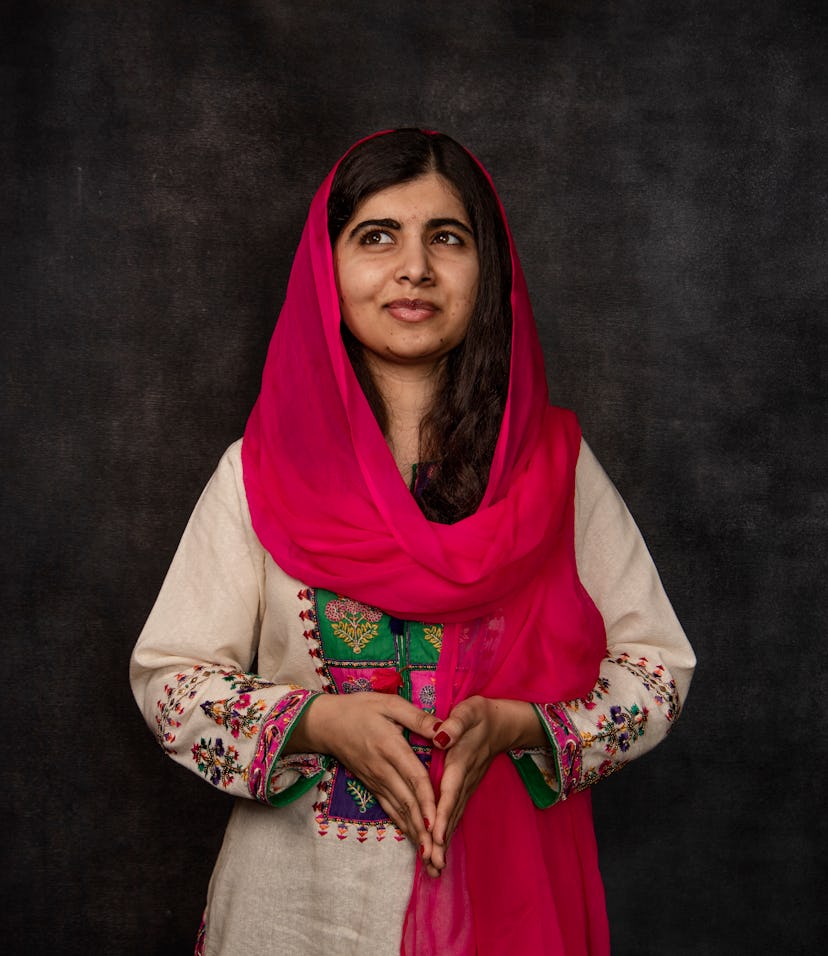Rule Breakers
Malala Has The Best Book Recommendations, Obviously
As a newly minted book-club host, the Nobel laureate sees reading as a way to correct course.

When Malala Yousafzai awoke in a Birmingham, England hospital in 2012, the 15-year-old was nearly 4,000 miles from her home in Pakistan. We know how she got there, how the Nobel laureate’s fight for girls’ education made her a teenage target of the Taliban regime. But during that British winter, before the global accolades and interviews, her recovery included nagging headaches and trouble focusing. Reading provided solace. As a gift, she'd received 25 books from former British Prime Minister Gordon Brown. Her favorite among them? L. Frank Baum’s The Wonderful Wizard of Oz.
The novel’s themes — of rapid displacement, and moving forward while longing for home — were a precursor to her own young-adult book, 2019’s We Are Displaced: My Journey and Stories from Refugee Girls Around the World, in which Yousafzai created a space for some of the roughly 79.5 million displaced people to share their experiences.
This October, she’s launching a monthly book club with similar intentions. “My hope is that readers join to explore new ideas and voices in the literary world,” she tells Bustle. “And I hope it’s a moment of empowerment for the authors.” The club, called Fearless, will be hosted by the literary startup Literati. It's her first foray back into public life since graduating from Oxford University in June. Yousafzai, now 23, is letting her “to be read” pile expand indefinitely, she says. And while she can’t unveil the club's inaugural book just yet, she talks to Bustle about her favorite authors, genres, and which book she’d recommend to America’s reading-averse president.
You just graduated from Oxford, congratulations! Did you have a favorite book you read during your time there?
In university my favorite was Plato's The Republic. I could talk about it for hours. Sophie's World was really good. It’s about the history of philosophy, which can be quite boring and exhausting, but as a novel. Stolen Girls: Survivors of Boko Haram Tell Their Story is about girls abducted in Nigeria. It's a really powerful story.
Have you always been a big reader?
I’ve been passionate about reading and learning, but didn’t have access to many books. In Pakistan, I had only eight or nine books until age 15. For me, that was a huge accomplishment. In most schools in Pakistan, students are limited to their school textbooks, and not all students have access to libraries or books outside their school curriculum. I had the opportunity to read books including The Alchemist and A Brief History of Time. The Alchemist became my all-time favorite book.
Have you been in a book club before?
I have been, and recently made one for my friends from Pakistan and India. We’re focusing on books in South Asia, and it's quite extraordinary to focus on books from your region, like, "Do we have enough books on that part of the world? Who is writing those?” It's fascinating.
Are you reading anything right now?
I'm reading Why I’m No Longer Talking to White People About Race, [and] Winners Take All: The Elite Charade of Changing the World. I ordered Caste: The Origins of Our Discontents, which I feel is very much needed right now. If I had the option, I could sit for months and read. Just read, read, and read.
Lots of nonfiction! Do you prefer that to fiction?
My preference is nonfiction, mostly autobiographies and real-life stories, or novels that reflect the real world.
Would you ever consider writing fiction?
I would love to! That would be incredible. I commend the authors who write incredible books. It's hard work, even when you're writing your own story.
Who are your all-time favorite authors?
There was one book called The Breadwinner, [by] Deborah Ellis. She’s an amazing author, and I read the whole series. They’re about these Afghan girls and how they dress like boys so that they’re treated fairly and can go outside and go to school. It tells you how unequal society is based on gender.
If you were going to suggest one book for young millennial women, what would you recommend?
There was one book I really enjoyed, called Factfulness: Ten Reasons We're Wrong About the World — And Why Things Are Better Than You Think. For somebody like me, who’s doing activism and campaigning for girls’ education, it's important to get a bigger picture of where the world has been, and how it’s progressed. Stolen Girls is another I’d recommend.
If you had the power to make President Trump read one book, which book would you choose?
That's a really hard question. I wish he would read. Based on what’s happening right now, Why I’m No Longer Talking to White People About Race. I just started [it], but it’s a sophisticated and detailed approach to defining structural racism. It’s [about] being educated and understanding what racism is, and how it’s embedded within our systems. I want the president to know a lot of things. I want him to learn a lot.
This interview has been edited and condensed for clarity.
This article was originally published on